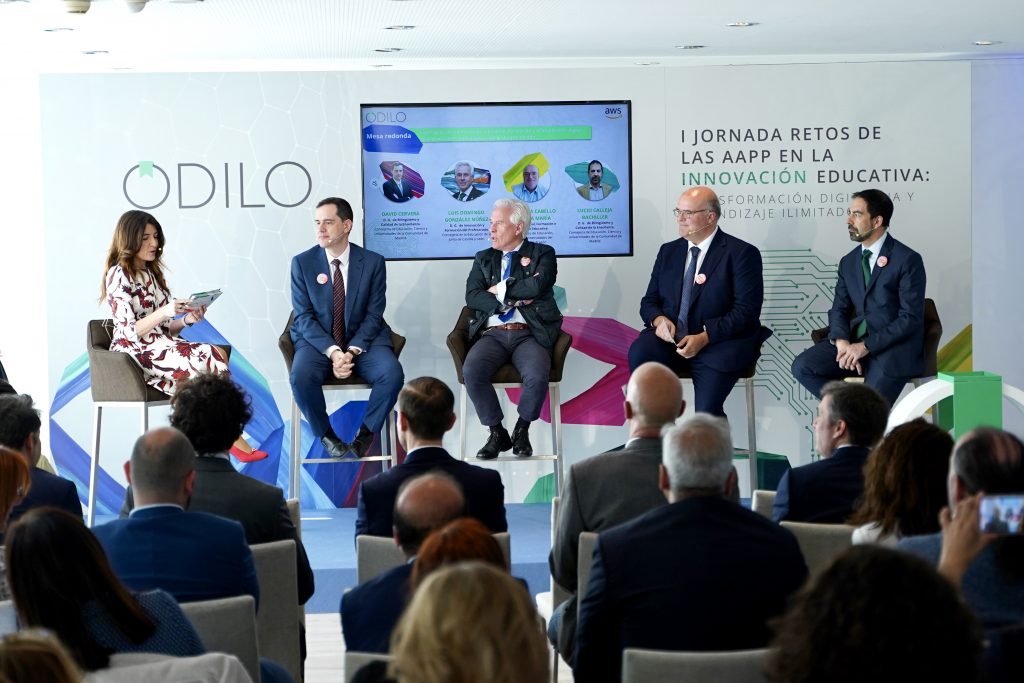Categories:
- This initiative is in line with other successful programs already implemented, such as LeemosCLM.
- The Board also points out the importance of implementing AI and new technologies in the move towards improved learning.
- This was explained by Lucio César Calleja Bachiller, G.D. for Educational Innovation and Centers at the Regional Ministry of Education, Culture and Sports, during the ‘I Jornada: Retos de las AAPP en la Innovación Educativa’ organized by edtech ODILO.
Madrid, April 25, 2024 – The Ministry of Education of the Regional Government of Castilla-La Mancha assures the commitment of the regional government to create specific training plans for teachers to be prepared for the technological future of education. According to Lucio César Calleja Bachiller, General Director of Educational Innovation and Centers of the Regional Ministry of Education, Culture and Sports: “We have a very advanced digitalization plan that complements the work that teachers are doing every day in their classrooms. That is why we are committed to their training. We have to develop training plans so that they can know how to use the devices, just as we must do with the students so that they can learn with us. This is an issue in which we must also involve families“.
This was one of his contributions during the celebration of the ‘I Jornada: Retos de las AAPP en la Innovación Educativa’ which was also attended by María del Ángel Muñoz, General Director of Educational Planning and Management of the Ministry of Education, Vocational Training and Sports, in addition to representatives of the Ministries of Education and Innovation of the communities of Aragón, Balearic Islands, Castilla-La Mancha, Castilla y León, Canary Islands, Catalonia, Community of Madrid, Extremadura, Galicia, Murcia, Community of Navarra and the autonomous city of Melilla, and representatives of the National Institute of Educational Technologies and Teacher Training (INTEF).
In this regard, Calleja Bachiller highlighted the success of the implementation of LeemosCLM, an ecosystem developed by ODILO, the Spanish edtech that allows all types of organizations and institutions to create their own Unlimited Learning Ecosystem, which was at the forefront of the event: “LeemosCLM is a tool that allows teachers to guide their students’ reading as a means to improve reading skills. The experience of these years working with the tool, with a progressive increase in users, makes us continue to bet on it with the certainty that it will continue to contribute to the goal of training more and better readers.
On the incorporation of new technologies in education, the director general appealed to the interest of teachers in their implementation and the high degree of involvement they have in this regard. At the same time, he pointed out the need to accompany them in training and bet on the progressive technological advancement of educational centers and a responsible use of these devices: “We cannot limit AI, if we are the first ones to use it on a daily basis. The most important thing is to teach how to do. The knowledge remains the same, but now we carry it all in our pockets. Therefore, we must teach how to use these new tools. In short, we should not limit the use of AI when teachers also use it to prepare classes,” he said.
The Board is in line with the line of action of the Ministry of Finance.
Along the same lines as Calleja Bachiller, the General Director of Educational Planning and Management of the Ministry of Education, Vocational Training and Sports, María del Ángel Muñoz, pointed out that “The role of the teacher has changed a lot. It is essential to take care of them and support them so that they can take up the challenge of teaching our students in an increasingly digitalized society. We have wonderful professionals, who are becoming a scarce commodity in Europe, whom we must inspire to improve the education of students”.
To achieve this goal, the director general placed special emphasis on the commitment to public-private collaboration to advance the training of Spanish students towards the education of the future: “We must not lose sight of the objective of the education system: to train students to become good professionals and citizens in a society as technologically advanced as the one in which they will live”.
Finally, Ainhoa Marcos, VP Education Spain & Global K12 Sales Director of ODILO said that “this conference represents an important step in the path towards educational innovation and continue to inspire our work and motivation to continue working in the search for innovative solutions for education,” she said, who concluded by expressing “the importance of collaboration between the public and private sector, as together we can work on creative and effective solutions that benefit our students and strengthen unlimited learning”.
ABOUT ODILO
ODILO is a digital education company that enables any organization to create its own Learning Ecosystem, offering its users unlimited access to the world’s largest catalog of multi-format educational content, and the ability to create all kinds of learning experiences without restrictions. More than 9,100 organizations from over 54 countries have already created Unlimited Learning Ecosystems that provide access to learning to an aggregate base of +170 million users.
ODILO, the world’s largest educational ecosystem, has content agreements with more than 7,300 providers of digital educational content in all formats (courses, interactive applications, videos, podcasts, press, magazines, audiobooks, books, etc.).
ODILO is a multi-vertical company, which promotes learning in Private Companies, Public and Private Schools, Public and Private Universities, Certified Vocational Training, Public Administration and Government.
